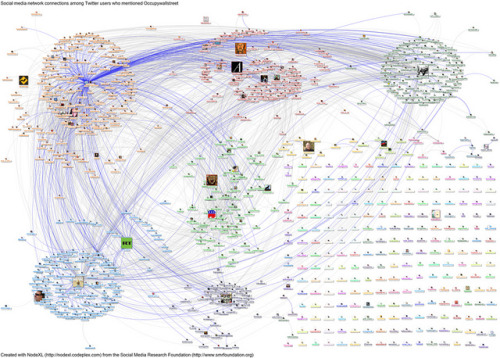Foto de fllujos en Twitter infografía vía Fernand0
The Occupy movement, like Facebook, serves as a platform to bring together those who have been separated by geography and social stratification these past few decades. I have seen Occupy Portland serve as a place for WWII veterans to talk with Iraq War protesters (many of whom are veterans themselves); I have seen Generation X professors holding interactive educational workshops for blue-collar babyboomers who never had the opportunity to attend college; I have seen people with Ron Paul signs and people passing out literature for the Socialist Party having perfectly amiable conversations about the best way to end the Federal Reserve system. The vital conversations that haven’t been happening in American society the past few decades are happening now on Occupied grounds, and for the most part, they’re happening at a mature, respectful level. I suppose in that respect, Occupy may have little in common with Facebook—though that might have something to do with people generally being more polite offline than on. But it seems evident that Occupy owes its immediate success to filling the same void that Facebook seeks to fill. Call it the need for the tribe, or the longing for community; call it the absence of fellowship or a sense of having been unplugged from the collective unconscious. There is a feeling in the pit of one’s stomach that we have lost something, and only now, as we rediscover just what that something is, do we begin to realize the damage its absence has done to our civilization.The Portland Occupier (2011, nov 9). American Occupy Movement and the way futureward, part I [blog post]. Retrieved from http://portlandoccupier.tumblr.com/post/12558363126/american-occupy-movement-and-the-way-futureward-part-i

No hay comentarios:
Publicar un comentario